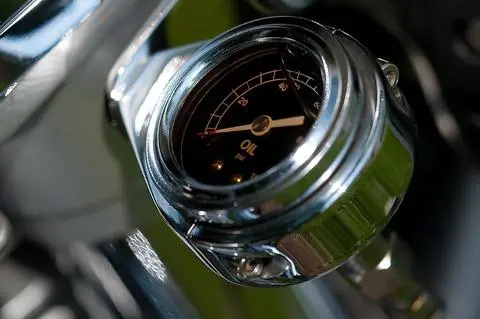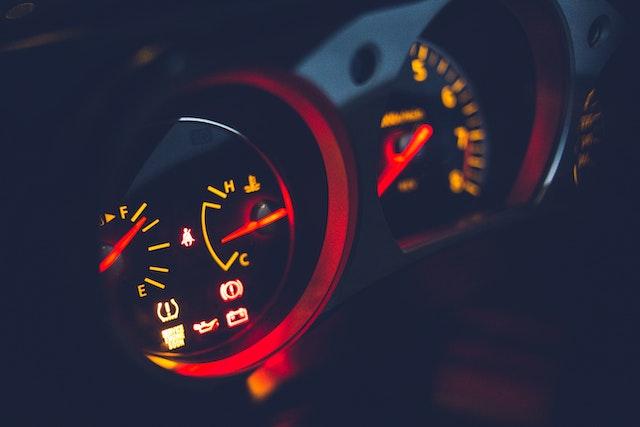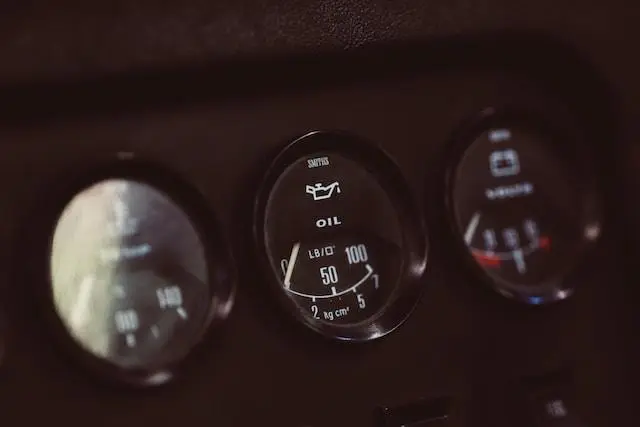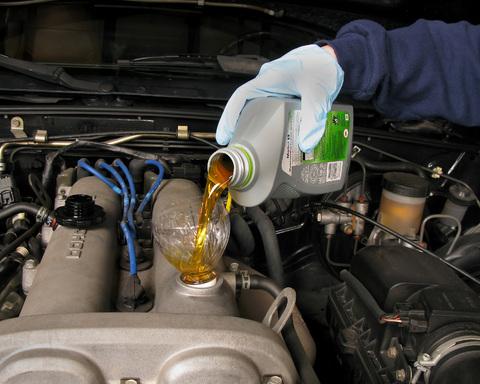What is an Oil Pressure Sensor?
Published Date: 17th Jul 2023
 The oil pressure sensor is a vital component in your car's engine, responsible for monitoring and detecting the oil pressure levels. It is located within the engine block and ensures proper lubrication and optimal performance of vital engine parts. Constantly monitoring oil pressure provides valuable data to the engine management system, allowing for timely detection and prevention of potential issues.
The oil pressure sensor is a vital component in your car's engine, responsible for monitoring and detecting the oil pressure levels. It is located within the engine block and ensures proper lubrication and optimal performance of vital engine parts. Constantly monitoring oil pressure provides valuable data to the engine management system, allowing for timely detection and prevention of potential issues.
Why is the oil pressure sensor important?
The oil pressure sensor is a relatively simple yet essential device. If the sensor malfunctions or fails, it can lead to inaccurate oil pressure readings or the absence of warning signals for low oil pressure, potentially causing severe engine damage. Therefore, regular inspection and maintenance of the oil pressure sensor are crucial to ensure your car's engine's smooth operation and longevity.
What are the key components of the oil pressure sensor?
- Pressure sensor: The core component measures the oil pressure and sends electrical signals, which are converted into data to the engine control unit (ECU).
- Wiring and connectors: The electrical wiring and connectors enable the seamless transmission of signals between the sensor and the ECU, ensuring efficient communication and optimal functioning.
- Seals and gaskets: Ensure proper sealing to prevent oil leaks and maintain accurate pressure readings.
What should I do if I notice problems with my oil pressure sensor?
If you notice warning lights indicating low oil pressure or suspect any issues with your vehicle's oil pressure, you should promptly consult a qualified technician or mechanic. They can diagnose and address any problems with the oil pressure sensor to safeguard your engine's health and optimize your driving experience.
Here are some tips to help you keep your oil pressure sensor in good working order:
 Check the oil pressure regularly and ensure it meets the manufacturer's specifications.
Check the oil pressure regularly and ensure it meets the manufacturer's specifications.- Change the oil and filter according to the manufacturer's recommendations.
- Always use high-quality oil and filters.
- Periodically inspect the oil pressure sensor for signs of damage or corrosion.
- Consult a qualified technician or mechanic if you have concerns about your oil pressure sensor.
By following these tips, you can help ensure that your oil pressure sensor is properly maintained and your car's engine is protected from damage.
There are two main types of oil pressure sensors:
- Variable resistance sensors: These sensors use a variable resistor to measure the oil pressure. As the oil pressure increases, the sensor's resistance decreases, which sends a signal to the engine control unit (ECU).
- Hall effect sensors: These sensors use a Hall effect sensor to measure the oil pressure. The Hall effect sensor generates a voltage signal proportional to the oil pressure.
Variable resistance sensors are widely used as oil pressure sensors. They are relatively cost-effective and simple to install. Nonetheless, they may experience wear and tear, potentially resulting in imprecise readings.
Hall effect sensors are more expensive than variable resistance sensors but are more accurate and reliable. They are also less susceptible to wear and tear.
In addition to these two main types, there are also a number of other types of oil pressure sensors, such as:
- Piezoelectric sensors: Use a piezoelectric crystal to measure the oil pressure. The piezoelectric crystal generates an electrical signal when it is subjected to pressure.
- Magnetic sensors: These sensors use a magnet to measure the oil pressure. The magnet generates a magnetic field distorted by the oil pressure. The sensor then measures this distortion to understand the oil pressure in the engine.
The type of oil pressure sensor used in a particular car will depend on the manufacturer's specifications.
Which type of Oil Pressure Sensor is better?
When choosing the best oil pressure sensor for your vehicle, it's essential to consider your specific needs and the requirements of your car. Let's take a closer look at the two main types of oil pressure sensors, along with their advantages and disadvantages:
 Mechanical oil pressure sensor: Known for its reliability, an automatic sensor uses a diaphragm and mechanical linkage to measure oil pressure accurately. However, it's important to note that mechanical sensors require a physical connection to the gauge or warning light, limiting their compatibility with modern electronic systems.
Mechanical oil pressure sensor: Known for its reliability, an automatic sensor uses a diaphragm and mechanical linkage to measure oil pressure accurately. However, it's important to note that mechanical sensors require a physical connection to the gauge or warning light, limiting their compatibility with modern electronic systems.- Electronic oil pressure sensor: In modern vehicles with electronic control systems, electronic sensors utilize pressure transducers to convert oil pressure into electrical signals. These sensors provide accurate measurements, improved compatibility with electronic displays and warning systems, and the capacity to transmit data to the engine control unit (ECU). Electronic sensors offer added functionalities alongside diagnostic capabilities and integration with onboard computer systems.
Choosing the Right Oil Pressure Sensor
When selecting an oil pressure sensor, it's important to consider the following factors:
- Vehicle make and model: Check the manufacturer's recommendations, as some cars may require specific types of oil pressure sensors.
- Application: When it comes to specialized applications such as racing cars or heavy-duty vehicles, it is important to consider sensors with specific features and performance characteristics to meet your needs effectively.
- Personal preferences: Some individuals prefer the simplicity and reliability of mechanical sensors, while others appreciate the advanced functionality and integration of electronic sensors.
It's also important to consider the cost of the sensor, as well as the availability of replacement parts and technical support.
Consulting a Professional
If further clarification is required regarding the suitable type of oil pressure sensor, it is recommended to seek guidance from a professional. A qualified technician or automotive expert can assist in selecting the compatible sensor that meets your vehicle requirements.
- Oil pressure sensors play a vital role in ensuring the safety of your engine by protecting it from potential damage.
- A failed oil pressure sensor can lead to engine overheating or seizing up, highlighting the importance of regular inspection and testing.
Common Problems with Oil Pressure Sensors
Typical challenges and concerns associated with oil pressure sensors may differ based on the particular sensor type and the make and model of the vehicle. Nevertheless, here are some prevalent issues that may arise.
 Sensor failure: Over time, oil pressure sensors may experience failure due to factors such as wear and tear, exposure to high temperatures, or electrical issues. A malfunctioning sensor can result in inaccurate or lack of readings.
Sensor failure: Over time, oil pressure sensors may experience failure due to factors such as wear and tear, exposure to high temperatures, or electrical issues. A malfunctioning sensor can result in inaccurate or lack of readings.- Oil leaks: Oil pressure sensors are commonly situated in close proximity to the engine block, rendering them vulnerable to oil leaks. Such leaks can result in a decline in oil pressure, potentially causing damage to the engine.
- Clogging or blockage: Clogging or blocking oil pressure sensors by debris or sludge in the oil system can lead to inaccurate or no readings.
- Wiring or connector issues: The wiring or connectors that connect the oil pressure sensor to the vehicle's electrical system can become damaged or loose, leading to faulty readings or a complete sensor failure.
- Corrosion: Over time, corrosion can occur on the sensor's terminals or connectors, affecting its performance and accuracy.
- Faulty warning light or gauge: In certain instances, the problem may not be attributed to the sensor directly but rather to the warning light or gauge that receives the sensor's signals. Malfunctions in the instrument cluster or wiring can result in inaccurate readings or the activation of the oil pressure warning light.
Suppose you experience any symptoms of low oil pressure, such as oil pressure warning lights, abnormal engine noises, or inconsistent oil pressure readings. In that case, having the oil pressure sensor and associated components inspected and tested by a qualified technician or mechanic is recommended. They can diagnose the specific fault and provide the repairs or replacement parts to ensure the proper functioning of the oil pressure sensor.
New Car Deals from Uk Car Discount
Discover your perfect car with the guidance of our team of expert sales professionals. From start to finish, we'll work with you to find the ideal vehicle to match your needs. Contact UK Car Discount today and explore our wide selection of New Cars at Amazing Discounts.
Call us today at 0161 946 3500 to discuss how we can guide you with your Next New Car.
READ THE LATEST NEW CAR JARGON ARTICLES HERE
